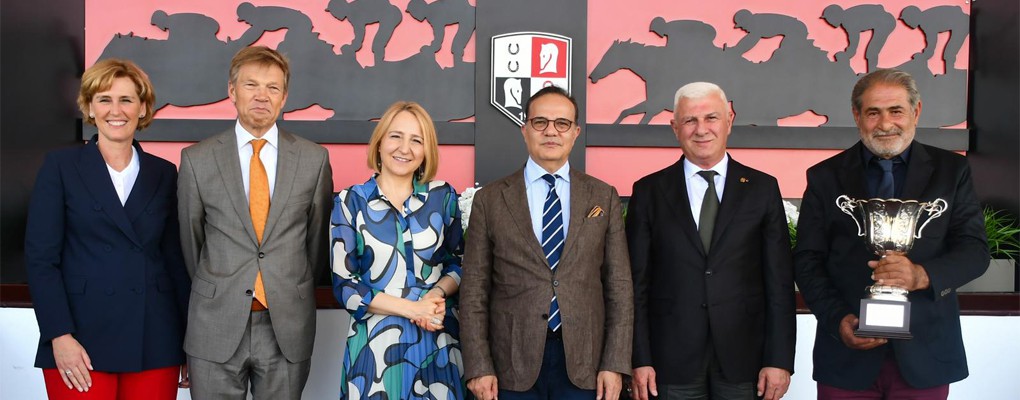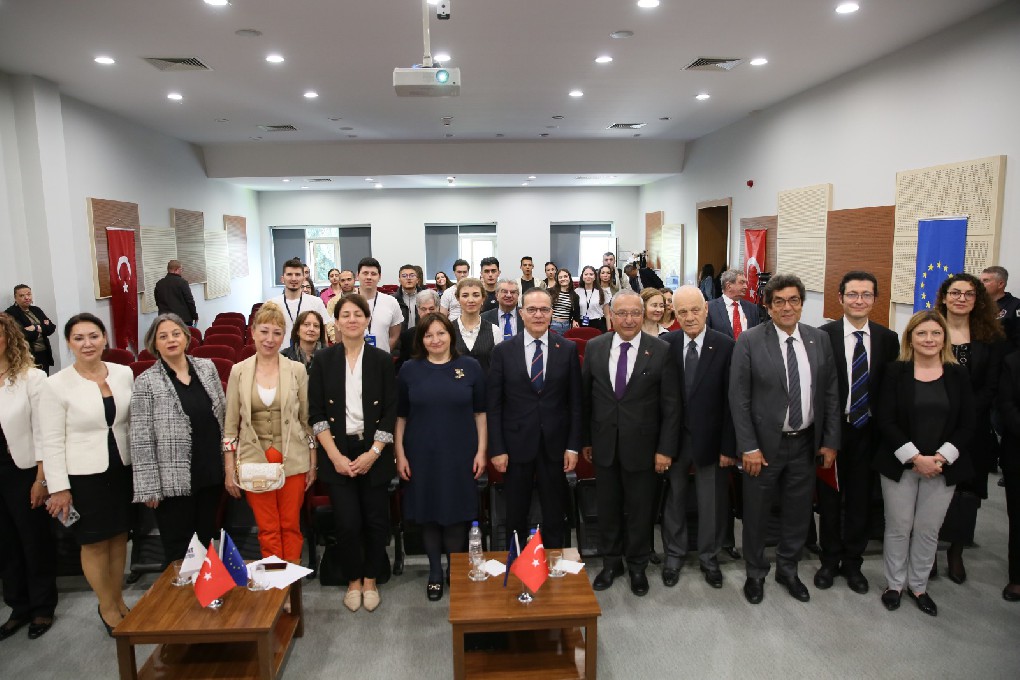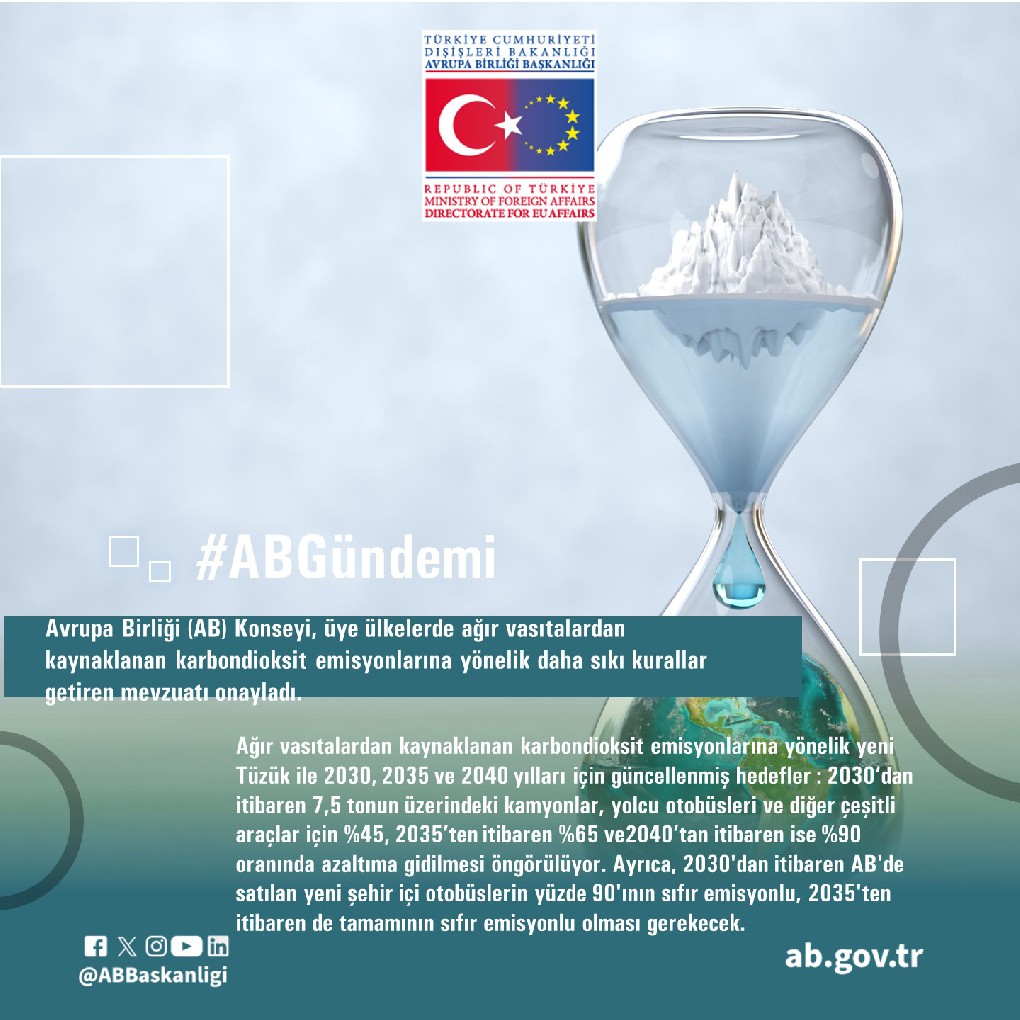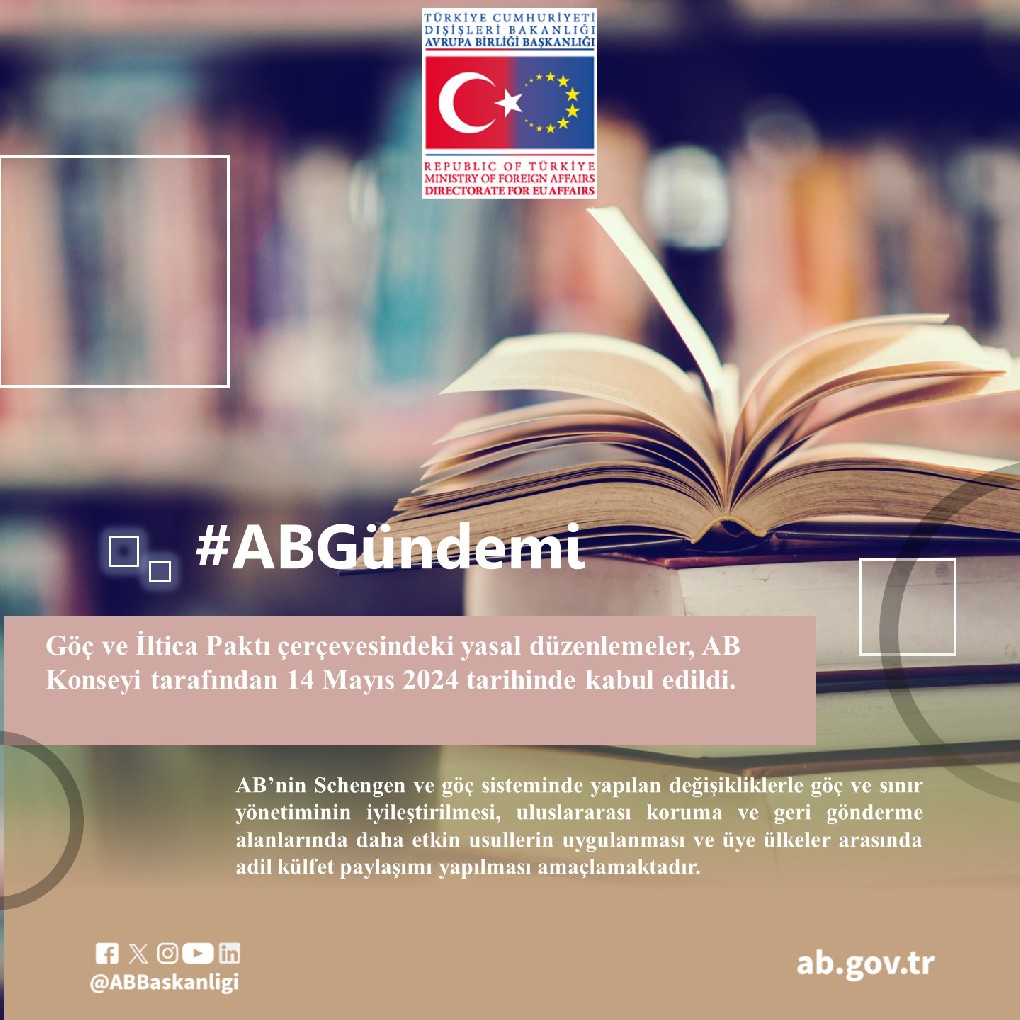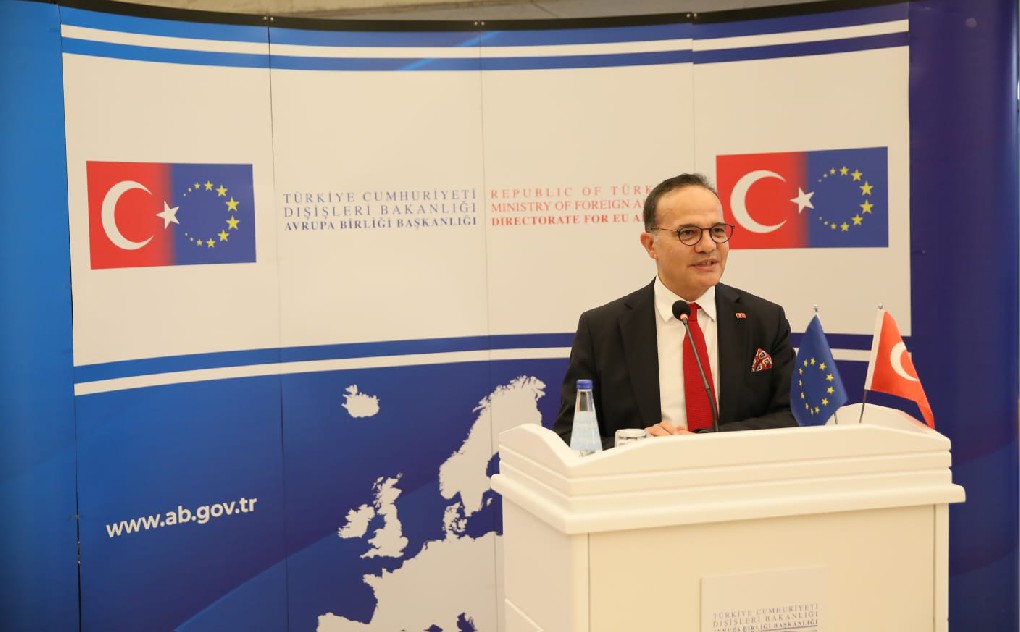- HOMEWelcome
- DIRECTORATE FOR EU AFFAIRSStructure
- E.U.Structure
- TÜRKİYE-EU RELATIONS
- History of Türkiye- EU Relations
- Main Documents
- Agreements
- Protocols
- Accession Partnership Documents
- National Programmes for the Adoption of the Acquis (NPAA)
- Türkiye Reports Prepared by the European Commission
- Enlargement Strategy Papers
- Türkiye’s National Action Plan for the EU Accession
- Türkiye’s National Action Plan for the EU Accession (2021-2023)
- Association Council Decisions
- Documents on Türkiye-EU Summits
- Institutional Structure
- Customs Union
- Türkiye- EU High Level Dialogue Meetings
- DATASources
- MEDIANews
- CONTACTContact Us
Interview of Egemen Bagis Published in French Politique Internationale Magazine
Please find below the English version of the interview with Minister for EU Affairs and Chief Negotiator of Türkiye, Egemen Bagis, published in French magazine Politique Internationale. The original text can be reached through the following link:
http://politiqueinternationale.com/revue/article.php?id_revue=136&id=1115&content=synopsis#show1
INTERVIEW OF EGEMEN BAGIS PUBLISHED IN FRENCH POLTIQUE INTERNATIONALE MAGAZINE
Marc Semo — H.E. Minister, Francois Hollande won the elections; can this result open a new page in Türkiye-France relations that have been seriously damaged during Nicolas Sarkozy’s 5-year presidency?
Egemen Bağış — I hope and wish so. In any case, it’s the mission of the new President of France and his team to fulfil our favourable expectation. We cannot force anyone to adopt a favourable position, but any country that treats Türkiye well will gain our friendship. We expect the new President to be objective and have European values and not to use Türkiye’s EU target for internal politics. If I were to express it briefly, we would like the new President to have the national interests of France as his main target. Nicolas Sarkozy opposed the full membership of Türkiye and vetoed the opening of five EU chapters to negotiations which most of all damaged the interests of France. Even the Commission was amazed by this decision. We expect Francois Hollande to support Türkiye, not because Türkiye has a population of 75 million, but because they have to consider the interests of French companies. The construction of a third bridge over the Bosphorus has been launched; I have learned that the BTP, which is a large group of French companies that deal with public works, contacted some Turkish companies in the sector for a joint venture or a partnership in order to be able to submit a bid. None of the Turkish companies replied to this company’s call, feeling that a French partner would be a more of a disadvantage than an advantage. There are other examples as well. We have to revitalise our relations. France is a friend and an ally with whom we have had diplomatic relations for more than four centuries. Furthermore, we should not forget that 450 000 Turks and citizens of Turkish origin are currently living in France. Many of these are French citizens and they vote in France…
MS. — François Hollande supported bill in 2012 following the draft law in 2006, which criminalised the denial of the Armenian Genocide in the Ottoman Empire in 1915. Are you concerned that he will submit another bill like this again?
EB. — The decision of the French Constitutional Council, which annulled the bill submitted in the spring, cleared everything up. Rather than judging the events of a century ago, current problems should try to be solved. France, which has co-chaired the Minsk group for 20 years, can restart the dialogue between Armenia and Azerbaijan and this can affect our relations with Yerevan positively. Twenty years after the conflict in the Upper-Karabakh, it is acknowledged that more than one million Azeri people had been displaced and 20% of the Azerbaijan territory is under the occupation of Armenia. This poses a threat for regional stability and even for a wider geography. For this reason, Türkiye is ready to face its history. We are favourable to the establishment of a commission consisting of independent historians from all countries. We will allow access to the archives and information in order to clarify and understand the events of that period. However, the task of a parliamentarian or a politician is to prepare the future, not to write history.
MS. — Did gestures of regret, like Willy Brandt’s kneeling down in front of the Warsaw Ghetto, have a significant political importance at the time?
EB. — We have been generous with our gestures of goodwill to Armenia: We allowed landing of Armenian planes in Istanbul and I would like to remind that there are 100 000 Armenians living and working in Istanbul, including the ones working and living illegally. After the signing of the Protocols between Türkiye and Armenia in Switzerland, Abdullah Gül, the President of the Republic of Türkiye, went to Armenia to watch a football match and the President of Armenia came to Bursa to watch a football match. Unprecedented progress has been achieved in the relations between Türkiye and Armenia. However since then, relations have come to a halt because of the conflict between Armenia and Azerbaijan. For this reason, initiatives within the framework of the Minsk Group by Barack Obama and the President of France to restart the peace process between Yerevan and Baku are important.
MS. – It seems that there is almost no progress in Türkiye’s accession negotiations which started in October 2005. Only 13 chapters out of 35 have been opened to negotiations so far. No chapter has been opened to negotiations in 2011 and it seems that 2012 will be the same in this regard: You should not expect to make progress during the Presidency of Cyprus which will start on 1 July. How did you reach this point?
EB. – The main problem is position of the Southern Greek Cypriot Administration. In December 2006, the European Council, in order to punish our decision to not open our ports and airports to Greek Cypriots, decided to suspend accession negotiations on eight chapters. The Greek Cypriots also declared that they would oppose the opening of six more chapters to negotiations. Nicolas Sarkozy, right after being elected as president in 2007, announced that he politically blocked five chapters, one of which had already been suspended by the EU. Thus, a total of 17 chapters are blocked. The chapters which have not yet been opened to negotiations are the most complicated and usually worked on by the candidate countries towards the end of the negotiation process. The ongoing economic crisis in the EU for three years has not solved anything: Most of the countries are focused on the problems in the Euro Zone and they tend to avoid long term issues. But I am sure that each of the 27 member states will understand that the EU needs Türkiye as much as Türkiye needs the EU. We have learned to be patient. We have waited for almost half a century to get a date for the initiation of the accession negotiations. Although there were no new chapters opened to negotiations, we continued to introduce reforms. In other words, we continued the work to implement the EU legislation in the blocked chapters. This important process is what will make Türkiye more democratic, wealthy and powerful.
MS. — The Turkish Government has stated that it would not have any relations with the Presidency of the Cyprus since it did not recognise Republic of Cyprus. Aren’t you concerned about making your relations with Brussels a bit more difficult?
EB. — If the Southern Cypriot Greek Administration represented the entire island, we would welcome relations with this Administration; however, they only represent a part of the island: the Greek Cypriots. In the referendum held in April 2004, while the UN Annan Plan which provided for the unification of Cyprus in the form of a confederation, was accepted by a majority of the Turkish Cypriots in the North, it was rejected by a majority of the Greek Cypriots in the South. However, this situation did not prevent the Greek Cypriots from becoming a member of the EU a short time later. A decision was taken in unanimity at the European Council to end the isolation of the northern part of the island. The Greek Cypriots, who were the only party among the 27 EU member states to have commercial relations with the northern part of the island, are paradoxically not allowing other EU members to have commercial relations with the North by preventing the implementation of this EU decision. For example, if Air France Airlines is allowed to land in the Ercan Airport in the North, Türkiye is ready to open its ports and airports to the Greek Cypriots. As in the Taiwan example, having commercial relations with a country does not mean diplomatic recognition. Since 1973, we do not recognise the Republic of Cyprus. For the six month period of the EU Presidency, we do not want to have to recognise it even if implicitly. Therefore, we will have no relations with their authorities and all issues will be readdressed during the Irish Presidency in January. Furthermore, we will continue our relations with the Commission throughout this period. The Commission is aware of Türkiye’s importance and the “Positive Agenda”, which we initiated with the Commission in the middle of May, is an indicator of this awareness.
MS. — What is this “Positive Agenda”?
EB. — The “Positive Agenda” is not an alternative to the EU accession process, but rather a way to revitalise the membership process. The establishment of working groups in eight chapters that have been suspended by the European Council are envisioned. There will also be working groups on energy issues, the fight against international terrorism and the visa issue. This is a means –with the support of the Commission- to continue with the reforms, for mutual re-evaluations and to carry out discussions on various issues. I have the opportunity to frequently meet and work with Stefan Füle, the Commissioner for Enlargement and European Neighbourhood Policy. However, it is important for Turkish Ministers, such as the Minister of Interior, the Minister of Justice, the Minister of Foreign Affairs and the Minister of Environment, to meet with their counterparts in the Commission to work on significant issues in accordance with our common interests.
MS. – Are you worried about the increasing scepticism of Turks towards Europe? What do you think about this unpleasant situation?
EB. – The erosion in pro-European public opinion is a consequence of a number of hurtful statements and decisions concerning Türkiye. While the EU accession process continues, Türkiye is the only candidate country whose nationals are required to obtain a visa to enter EU member states. Another reason is the reluctance of our European partners to support us in our fight against PKK terrorism. The Cyprus issue also contributes to this negative outlook. Although the issue of unification of Cyprus was not a condition for the Southern Greek Cypriot Administration to become a member of the EU, it has been brought before Türkiye as such. The Turkish President and Prime Minister have not been invited to EU Summits for five years. These are only a few examples that can be given…
MS. – Is it Türkiye’s aim to be a member of the EU? Would you be satisfied with the “privileged partnership” status proposed by Nicolas Sarkozy and Angela Merkel?
EB. – The Founding Treaties and EU texts refer to candidate counties, acceding countries and EU member states. The “privileged partnership” status is not referred to in any part of those texts consisting of thousands of pages. This term does not have any legal basis. We are already a part of the customs union and European institutions. Türkiye will either become a full member or not.
MS. –Has the Euro crisis and economic recession given Türkiye (its economic growth reaching %9 in 2011) an advantage over the 27 EU Member States?
EB. – Türkiye has more than ever become an opportunity for Europe. I went to Davos in January to participate in the World Economic Forum and encountered a pessimistic atmosphere while talking to the European heads of state, or governments, or their representatives. I could not help thinking: “Come on, shake off the dust and pull yourselves together! You have been through much worse in the past just like we have!” Between the years of 1999 and 2001, Türkiye suffered a very serious financial crisis because of the successive bankruptcies and exchange rate fluctuations of the Turkish Lira. During the crisis, debts of the companies and individuals tripled in few days or even overnight. What did we do then? We re-structured and improved the financial system. We worked hard, restored fiscal discipline, regained the confidence of the people and ensured stability. Today, we have the most dynamic economy of Europe, and we are ranked second, after China, among the G-8 countries. Europe should regain its self-confidence as well. Despite the crisis, Europe is still the wealthiest region of the world. I am not only referring to the average per capita income but also human rights and freedom of expression, food security and renewable energy standards. The European project has ensured peace and stability in this continent. What it lacks now is the political will and genuine leadership.
MS. – What will Türkiye bring to Europe?
EB. – Türkiye offers European companies an extensive market of a population of 75 million. Furthermore, it is possible to reach one-fourth of the world population and 56 countries in the Balkans, the Middle East and Central Asia with just a four-hour flight from Istanbul. We are ready to help; however, we are expecting more favourable treatment from the 27 EU members. In addition, we need to overcome our prejudices in order to jointly confront common issues. The crisis in the Euro Zone and the problems that the EU has been experiencing affect us directly. Half of our exports are to EU Member States. % 65 of the tourists visiting Türkiye is Europeans. Similarly, %85 of the foreign investments in Türkiye and a large part of the new technologies is from the EU Member States.
MS. - What are your recommendations to the Europeans to overcome the economic crisis?
EB. – I advise them to work more and to re-discover the values on which the Union is founded, in particular democracy. It is impossible to realise sound structural reforms with temporary governments or teams of technocrats. Only governments that have the full support of their people can make such changes. If the important points are clearly explained, the people will stand behind the government despite difficulties. We have experienced this. When Recep Tayyip Erdoğan, the Prime Minister, won the elections in November 2002, together with the AK Party (Justice and Development Party), he refrained from making populist promises. Although we were struggling with a serious crisis, we said to our voters: “Do not expect much from us in the coming three years, but later you will see the difference in your budgets.” It was not easy in the beginning, but our people trusted us and the results are evident. Our wealth increased three-fold in ten years. Europe can also do the same.
MS. – Are you worried about the possibility that Greece may leave the Euro Zone?
EB. – Of course. Greece is our neighbour, an important trade partner and our NATO ally. We would like to see a strong Greece, not a weak one.
MS. – It is pointed out in the Progress Report by the European Commission that the reform process has slowed down despite the progress achieved. What is your opinion on this issue?
EB. – I don’t think that the reforms have slowed down. On the contrary, we have reached the EU norms regarding relations between the government and the military last year. The relations between religious minorities and the public authorities have improved and the problem on the acquisition of immovable properties by non-Muslim community foundations, which has been in a deadlock since 1930, was finally resolved. Our citizens of Armenian origin had religious services at the Armenian Holy Cross Church on the Akdamar Island on Lake Van for the first time in a century. Our citizens of Greek origin can have religious services again at the Sümela Monastery near Trabzon. While the former French president was trying to expel the Roma citizens from France, we built new housing for them for further integration to society. Whereas only fifteen years ago, our citizens of Kurdish origin could not say that they were Kurdish, today they have state television broadcasts for 24 hours in Kurdish. There are departments for the Kurdish language at our universities. The prisoners talk in their mother tongue with their relatives during visiting hours. We have made reforms in the field of the judiciary to safeguard the rights of defendants.
MS. – Today, nearly 100 journalists are in prison because of the law on the fight against terrorism which is being criticized by many lawyers and NGOs. Some of these criticisms are also in the most recent Progress Report of the European Commission.
EB. – These journalists are not in prison for being journalists but for being members of a terrorist organization or for committing crimes. Being a journalist does not mean that you cannot be punished.
MS. – Martin Schultz, President of the European Parliament and a member of the EP for the Social Democratic Party has become concerned about the situation of 15 deputies from the CHP (Republican People’s Party, main opposition party) and the BDP (Peace and Democracy Party, a pro-Kurdish party) who were still in prison during his visit to Ankara at the end of May.
EB. – We should be clear on this issue: None of the deputies were sent to prison. The persons you have mentioned are those who are in prison for being members of a terrorist organization or being involved in conspiracies aiming to overthrow the government. Their parties included them in the election lists hoping that they would be released. The judiciary rejected this. Only the judiciary can decide on this, not the government. The judiciary in Türkiye is independent. It is so independent that four years ago, a legal process was initiated to ban the ruling party and to disqualify the Prime Minister, the President and some of the members of the AK Party, including myself, from politics for years. The prosecutor accused me of making provocative statements. One of the statements, for which I was being accused, was as follows: “A woman has the right to wear a head scarf just as she has the right to wear miniskirts.” We did not go to complain to the Europeans. We waited for the judiciary to perform its duty against these kinds of ridiculous accusations, and finally, all of them were discarded.
MS. — The New Constitution which has been promised by AK Party for a long time has started to be discussed at last. A working group that includes representatives from four parties (AK Party, CHP, MHP, BDP) was formed in the TGNA. Do you believe that this project can be successful?
EB. — I am optimistic about this matter. For the first time in the history of the Republic, the TGNA reflects 95% of the will of the voters. This rate was about 70-75 % in the past because of the 10% election threshold. The four parties of the TGNA have agreed to work together in this group in which they are represented in equal numbers. This committee has received and heard non- governmental organisations, minorities and trade unions for one year. All these organizations have expressed their ideas and submitted proposals. Now the committee is busy with revising different articles. This new Constitution will also change the relations between Türkiye and the EU. The current Constitution was an outcome of the Coup d’état of September 1980 and the traces of this coup d’état can be observed in the Constitution despite several recent amendments. When Greece, Spain and Portugal freed themselves from the dictatorships, they each drafted a new constitution within the framework of their EU accession process. Now, we are drafting a new Constitution. Many of the problems you have also mentioned regarding freedom of the press and the freedoms in general terms stem from this text dated 1980.
MS. — Can Türkiye be a model for this region, particularly for the revolutions called the “Arab Spring”?
EB. — I prefer to call Türkiye a “source of inspiration” rather than a “model” or an “example”. We can play a role in this process with the European countries which emulate our growth, our economic dynamism and young population. We have a lot to teach the Near and Middle East countries and Central Asian countries about democracy, respect for the freedoms and protection of human rights. Muslim leaders go to Egypt and Libya and pray with the people there. However, the leaders from the Western world visit these countries to talk about democracy and secularism. We, as our Prime Minister Recep Tayyip Erdoğan did, can do both. Türkiye is the most eastern country of the West and the most western of the East. Türkiye’s contribution to the EU will be its increasing influence in the region.
MS. — What is the role that Türkiye can play in resolving the Syrian crisis?
EB. — We are doing our best to find a diplomatic solution to this tragedy. We know this region better than many of the EU Member States. We are hosting more than 25 000 refugees from Syria within our territory. At the very beginning of the crisis, Prime Minister Recep Tayyip Erdoğan tried to persuade the Syrian President Bashar Al-Assad to listen to his people and to carry out the reforms. If Syria had been able to realise just 10% of what Türkiye has done, we would not be talking about this big problem now. Our region has been witness to many wars, so we should deal with these matters through other means. We are addressing this matter within a diplomatic framework and in coordination with our European partners, such as France and with our partners from the United Nations, such as Russia and China. Above all, these matters are under the authority of my colleague Ahmet Davutoğlu, the Minister of Foreign Affairs, but I would like to draw attention to some issues. Several meetings were held in Istanbul successively between the end of May and the beginning of June: Alliance of Civilizations Istanbul Conference, World Economic Forum and a conference on Somalia. Before these meetings, we hosted the conference of the Groups of Friends of Syrian People. From now on, Türkiye has become an indispensable partner in the diplomatic area not only regionally but also globally.




